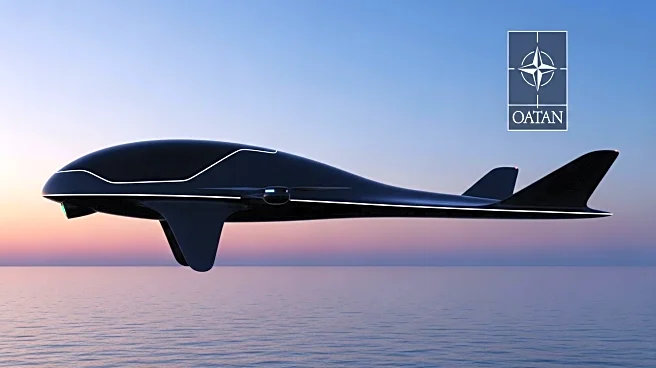What is the story about?
What's Happening?
NATO has announced an upgrade to its mission in the Baltic Sea region after Denmark reported sightings of unidentified drones near its military installations. The Danish armed forces observed these drones overnight, leading to temporary closures of several airports, including Copenhagen's. In response, NATO plans to deploy additional intelligence, surveillance, and reconnaissance platforms, along with at least one air-defense frigate, to bolster its 'Baltic Sentry' mission. This mission was initially launched in January to protect critical infrastructure following incidents of damage to power cables and pipelines on the Baltic Sea floor. The recent drone activity has heightened security concerns across Europe, prompting discussions among EU leaders on enhancing defenses and supporting Ukraine.
Why It's Important?
The drone sightings over Danish military bases underscore the growing security challenges in Europe, particularly in the Baltic region. NATO's decision to enhance its mission reflects the alliance's commitment to safeguarding critical infrastructure and deterring potential threats, primarily from Russia. The increased vigilance is crucial for maintaining stability in the region, as drone incursions have raised alarms about the vulnerability of European airspace. The situation also highlights the need for advanced drone detection and neutralization capabilities, which Denmark plans to acquire. The broader implications include potential shifts in defense policies and increased military cooperation among EU countries to counter perceived threats.
What's Next?
EU leaders are scheduled to meet in Copenhagen to discuss strategies for improving Europe's defenses against drone threats and supporting Ukraine. Additionally, defense ministers from 10 EU countries have agreed to strengthen eastern defenses with a 'drone wall' to deter Russia. Germany is considering authorizing its military to shoot down drones under certain conditions, reflecting the urgency of addressing drone threats. The ongoing developments may lead to increased military and political tensions in Europe, as Russia has criticized the measures as political games by EU elites. The situation remains fluid, with potential for further escalations or diplomatic engagements.
Beyond the Headlines
The drone incursions over Denmark and other European countries highlight the evolving nature of modern warfare, where unmanned aerial vehicles play a significant role. This development raises ethical and legal questions about the use of drones in military operations and the balance between security and privacy. The incidents also emphasize the importance of international cooperation in addressing transnational security threats, as well as the need for robust regulatory frameworks to govern drone usage. Long-term, these events could drive technological advancements in drone detection and defense systems, shaping the future of military strategy.














